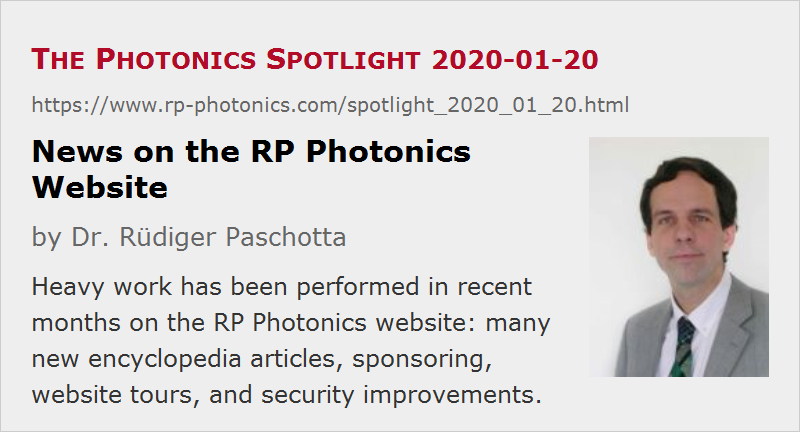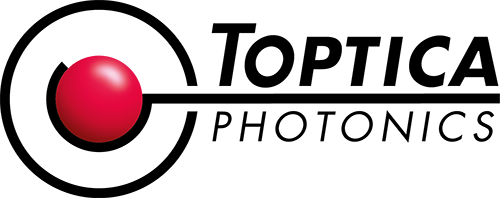News on the RP Photonics Website
Posted on 2020-01-20 as a part of the Photonics Spotlight (available as e-mail newsletter!)
Permanent link: https://www.rp-photonics.com/spotlight_2020_01_20.html
Author: Dr. Rüdiger Paschotta, RP Photonics Consulting GmbH
Abstract: Heavy work has been performed in recent months on the RP Photonics website: many new encyclopedia articles, sponsoring, website tours, and security improvements.

From about spring 2019 on, I have been investing particularly much time into the further development of our already extremely popular website. Here, I give you an overview on those news.
Many New Encyclopedia Articles
In 2019, I have authored additional 281 articles for the RP Photonics Encyclopedia, after having added only relatively few articles in recent years and concentrating mostly on the improvement of existing articles. It is hard to explain how I managed that in addition to all the other work; one detail is that quite a few weekends were involved. Besides, over the years I got fairly efficient in writing.
The reason for investing so much time into further expansion is mainly that I now want to largely cover the whole area of photonics, while previously I somewhat focused on my personal areas of expertise, such as laser technology, nonlinear optics fiber optics. That extension would not have made sense at the time where RP Photonics was essentially a consulting company, but with the introduction of the RP Photonics Buyer's Guide in 2012 this actually changed substantially. For suppliers having our ad package, the resulting enhanced entries are far more valuable if we have encyclopedia articles which are directly related to the advertised products. Note that their product descriptions then appear not only in the corresponding supplier listings, but even in the related encyclopedia articles – and those are usually far more popular than any supplier listing can be. The coverage of product-related topics is already pretty good: for nearly 70% of the products which can be registered we now have a related encyclopedia article.
For example, there are now many more articles on non-laser light sources, such as gas discharge lamps, metal vapor lamps, metal halide lamps and flash lamps. Although I do not have much personal experience with such devices, I can build on my well-trained ability to acquire and process new information from various sources. I actually find it quite interesting to learn a lot about their details, to carefully digest new information and then to present something really useful to my audience.
I have also added quite a few articles on fundamental topics like scotopic and photopic vision, color spaces, white light, luminosity functions and radiance. Such topics are often quite popular, particularly if certain interesting fundamental aspects are nicely explained. I hope you will enjoy reading e.g. the article on radiance.
Sponsoring
In autumn 2019, we had the idea to offer sponsoring opportunities related to the RP Photonics Encyclopedia. For such a popular resource, which is freely usable for photonics professionals worldwide, it is indeed quite natural to have sponsors who are happy to support this valuable service for the community and to get that publicly acknowledged. Compare that, for example, with sponsoring the coffee breaks at a conference; there, you get some exposure during a few days, while we give you visibility throughout the years in front of many thousands of professionals (for a similar price!).
I first contacted a number of our advertising customers and quickly saw that the response was rather positive. So I implemented that within a few weeks, and by now we have nine sponsors. For details, see our page on encyclopedia sponsoring.
Maybe your institution should also join the club?!
Website Tours
For a huge website like ours, having a wide range of different resources, there is always the risk that users do not recognize many other parts which would also be highly useful for them. It turned out that just by mentioning something like our fiber optics tutorials as a menu point on various pages isn't enough – many users tend to overlook such things.
The new solution is to offer what we call website tours. You can join such a tour just by following a link (on the website or in an e-mail, for example). You then get the tour navigation displayed in the right column, and you can easily follow the pages one by one, also reading some remarks in the tour navigation area.
So far, we offer the following tours:
- The RP Photonics Encyclopedia
- The latest articles of the RP Photonics Encyclopedia
- Using the Buyer's Guide
- Advertising in the Buyer's Guide
So even if you are already a regular user of our website, you may find out about interesting other aspects.
Improved Security
Website security is not a hot topic for everybody, but certainly deserves some attention. We regularly hear about people being hurt in some way by hacker attacks on websites. Many of those involve the exploitation of some cross-site scripting (XSS) vulnerabilities. Here, an attacker enters some script code, for example in an input form, which later on gets used by the web server for some outputs and may lead to the execution of malicious script code on the computers of other users. Note that such an attack does not require the attacker to hack the whole server account, e.g. getting access to a password for uploading modified web pages. Just entering some nasty stuff into a form may be enough e.g. to perform cookie steeling, installing malware, etc. It can be frightening to realize what certain innocent looking code running on a web server allows – with a huge damage potential even on websites which do not process particularly sensitive information.
Such things occasionally happen on social media portals, for example, and often have disastrous consequences. The most direct countermeasure is to carefully screen all code of the website for XSS vulnerabilities, but unfortunately it is quite hard to safely avoid any of those in a complex website.
Fortunately, one can build up a quite effective second line of defense, which suppresses most possible attacks even if some undetected XSS bugs would remain on the site. That concept is based on establishing a strict Content Security Policy (CSP), which basically tells the user's web browser not to do certain things, such as to execute any script code embedded into HTML pages, or at least not to load any script code from other servers than from the web server itself. I have recently invested several working days into implementing this concept, which required a number of technical adaptations but led to a substantial further improvement of the security of our website users. Our streamlined self-developed content management system made that implementation quite manageable.
Security ratings for websites are provided by various services such as the Mozilla Observatory. Here, we now get the security score A+. You may be curious to try that out for some of our main competitors; you will often find that they get the worst possible security level F. They typically have rather complex content management systems and will probably find it rather hard to get those repaired for high security.
This article is a posting of the Photonics Spotlight, authored by Dr. Rüdiger Paschotta. You may link to this page and cite it, because its location is permanent. See also the RP Photonics Encyclopedia.
Note that you can also receive the articles in the form of a newsletter or with an RSS feed.
Questions and Comments from Users
Here you can submit questions and comments. As far as they get accepted by the author, they will appear above this paragraph together with the author’s answer. The author will decide on acceptance based on certain criteria. Essentially, the issue must be of sufficiently broad interest.
Please do not enter personal data here; we would otherwise delete it soon. (See also our privacy declaration.) If you wish to receive personal feedback or consultancy from the author, please contact him e.g. via e-mail.
By submitting the information, you give your consent to the potential publication of your inputs on our website according to our rules. (If you later retract your consent, we will delete those inputs.) As your inputs are first reviewed by the author, they may be published with some delay.
 |



If you like this page, please share the link with your friends and colleagues, e.g. via social media:
These sharing buttons are implemented in a privacy-friendly way!